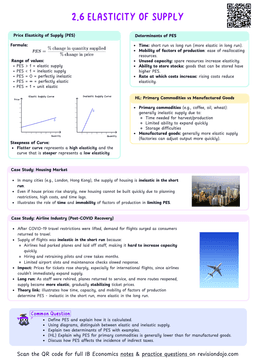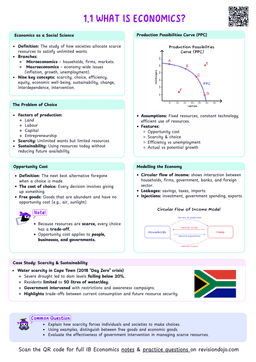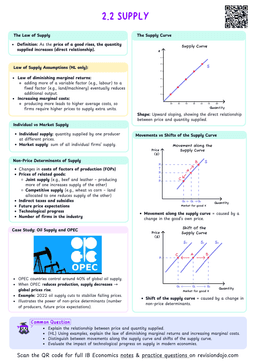Economists describe the economic world through two different lenses:
- Positive economics: descriptively.
- Normative economics: subjectively.
This section will explain both ways of thinking.
The role of positive economics
Positive economics
Way of thinking in economics that focuses on describing, explaining, and predicting economic events.
Positive economics aims to increase our understanding of the economic world. Positive economics:
- Relies on positive statements, which address what is, was, or will be.
- These statements are grounded in hypotheses, theories, and models to analyze economic activities, and can be:
- Descriptive: provide factual descriptions of economic conditions.
- Explanatory: explain events and illustrate cause-and-effect relationships.
- Predictive: predict future economic trends.
- Descriptive: "the inflation rate in the Thailand was 3.2% last year."
- Explanatory: "a higher price for potatoes results in fewer potatoes being purchased."
- Predictive: "interest rates will increase next quarter" predict future economic trends.
Positive economics aims to increase our understanding of the world through:
- The use of logic.
- The use of hypotheses, models, theories.
- The ceteris paribus assumption.
- Empirical evidence.
- Refutation.
The use of logic
Positive economics involves analyzing and interpreting the economic world to describe, explain, and predict economic events. This process relies on logic.
Logic is a systematic method of reasoning where:
- Conclusions are drawn from a sequence of true statements.
- Each statement in the chain is valid if the preceding statements are true.
- If prices rise, fewer consumers are willing and able to buy a good or service (since it is more expensive).
- The prices of tourism have risen.
- Therefore tourism will fall this year.
Why does positive economics make use of logic?
- Economists use logic to explain why events occur and to make future predictions.
- Logical thinking is crucial for developing hypotheses and theories about economic behaviour.
The use of hypotheses, models, and theories
To increase our understanding of the economic world and develop prediction, economist make use of hypotheses, models, and theories:
- Economists often start with a hypothesis.
- A hypothesis is a testable "supposition" about an economic relationship.
- The hypothesis is examined using data.
- If supported by evidence, the hypothesis may evolve into a model.
- A model is a simplified representation of reality designed to explain or predict outcomes.
- Over time, consistently validated models may contribute to broader theories, such as the theory of supply and demand.
- A theory is system of ideas intended to explain something based on general principles.
- Imagine an economist observes that there people tend to buy less cherries in winter (when they are more expensive). Then, the economist may:
- Formulate an hypothesis: "the greater the price of a good, the less quantity of the good people are willing and able to buy".
- Validate the hypothesis by observing data of many different goods (apples, laptops, houses...).
- Create a model to represent the relationship between the price of a good and the quantity of it consumers want and can to buy: the "demand" curve, which represents this relationship.
- Develop a theory: the Law of Demand, which generalizes the idea that price and quantity demanded are inversely related.
(We will learn more about demand and the Law of Demand on topic 2.1)
The ceteris paribus assumption
Ceteris paribus
A Latin expression that indicates all other variables besides those being considered are assumed to be unchanging.
The ceteris paribus assumption is used in economics to isolate the relationship between two variables by assuming that all other influencing factors remain unchanged. It is used because it:
- Isolates variables: helps economists focus on the relationship between specific variables without interference from external changes.
- Simplifies analysis: allows economists to focus on the primary variables under study without becoming overwhelmed by the interference of other factors.
- Facilitates predictions: provides a clearer understanding of how one variable affects another, which is crucial for making predictions.
- Foundation for models: many economic models, such as the demand and supply curves (more about that on Topic 2), rely on the ceteris paribus assumption to demonstrate relationships effectively.
- While the ceteris paribus assumption is widely used and and important in economics, it also has some limitations, such as:
- Unrealistic assumptions: in the real world, multiple factors often change simultaneously, making the ceteris paribus condition difficult to achieve.
- Dynamic systems: the economy is interconnected, and isolating variables can oversimplify complex relationships.
- Short-term use: the assumption is most valid for short-term analysis, where fewer changes are likely to occur.
Empirical evidence
Empirical evidence consists of real-world information, data, and observations acquired through real-world events.
- Since experiments are extremely difficult to be performed in economics (you cannot experiment with the world's economy), economists must analyse past events to try to learn from them.
- These past events are the empirical evidence economists use to learn about our economic world and develop models and theories.
Learning from past events (empirical evidence) is crucial in economics. By learning from the pasts, economists can improve the future.
Refutation
Refutation occurs when empirical evidence contradicts the predictions of a hypothesis. This process is essential for ensuring that economic theories are accurate and reliable:
- Hypotheses in economics are tested by comparing their predictions with real-world data.
- When the evidence does not align with the hypothesis, the theory is rejected.
- This iterative process helps economists refine their understanding and improve their models.The Role of Normative Economics
The role of normative economics
Normative economics
Way of thinking in economics that focuses on opinions and value judgments about what should or ought to happen in economic systems.
Normative economics focuses on opinions and value judgments about what should or ought to happen in economic systems. Normative economics aims to identify economic issues and recommend policies to solve them.
Value judgements
Value judgments are subjective beliefs about what is right or wrong, fair or unfair. These judgments guide decisions in economic policy-making.
- Unlike positive statements, value judgements cannot be proven true or false as they are opinions that depend on individual perspectives.
- These judgments guide decisions in economic policy-making.
The meaning of equity and equality
In subtopic 1.1.1, we introduced the differences between equity and equality. Let's recall what was said:
"Equity should be contrasted with equality. While equality refers to all having an equal amount of resource, equality refers to the idea of allocating resources in a way that is fair and just."
Equity
The condition of being fair and just.
Equality
The even distribution of resources, opportunities, and outcomes among individuals or groups within a society
In normative economics, there is a great ongoing discussion on wether societies should aim to be equal or equitable.
Theory of KnowledgeDo you believe economic decision-makers should strive to achieve equity or equality? Why?


